
Sign Up
Want to receive a newsletter to learn more about KuneKune pigs and other educational information? Sign up to have them delivered right to your inbox.
We look forwarded to sending you some great info.
KuneKune Pig Feeding 101: Everything You Need to Know
What to feed KuneKune Pigs
What to feed KuneKune pigs, how much to feed KuneKune pigs, what KuneKune Pigs cannot eat, what do KuneKune pigs eat, and more. Get the answers to all these questions. Feeding your KuneKune pigs the right diet is essential for their well-being. This guide will teach you everything you need to know about what they eat and how to keep them healthy.
KuneKune pigs are known for their friendly and docile nature, making them popular pets and farm animals. From breeding stock to high-end pork production, KuneKunes have many purposes. However, like all animals, they require a proper diet to maintain their health and well-being. In this guide, we'll explore what KuneKune pigs eat, What KuneKune pigs cannot eat, and how to much feed. We will be including their dietary needs and recommended feeding practices.
Understand the Nutritional Needs of KuneKune Pigs.
Before you get your new KuneKune pigs it’s important to understand their nutritional needs. Pigs in general are omnivores, which means they eat both plants and animals. Their diet should consist of a balance of protein, carbohydrates, and fats, as well as vitamins and minerals. A diet that is too high in fat can lead to obesity and other health problems, while a diet that is too low in fiber can cause digestive issues. It's important to provide them with a variety of foods to ensure they get all the nutrients they need.
KuneKunes are grazing animals and can fatten almost on grazing alone. However, like us, we cannot just eat the same thing over and over again without a well-rounded variety to ensure we receive all the vitamins and nutrients that we need to thrive. The same is true for our beloved KuneKune pigs. Since people hear this all over the internet, they think they do not have to feed grain at all. However, they cannot get all their nutrition from grazing alone. So, it is important to supplement them with grain. By feeding a high-quality feed along with grazing and surplus fruits and veggies, your KuneKunes will thrive.
Choose the Right Feed for Your KuneKune Pigs.
When it comes to feeding your KuneKune pigs, it's crucial to select the right feed. You can either opt for commercial pig feed, which is specifically formulated to meet the nutritional requirements of pigs, or you can create your feed mix. If you choose to create your feed mix, ensure that it contains a proper balance of protein, carbohydrates, and fats, in addition to essential vitamins and minerals. There are two recommended grains available in the market that are known to work best for KuneKune pigs. We will delve deeper into this topic below.
It is important to understand that how you feed your KuneKune pig will have a direct impact on how they turn out as adults. For example: lower-quality feeds will make for an adult with a narrower head and longer snout. My husband once said that if you do not provide for your KuneKune pig, God will. He will allow those snouts to be longer so they can root out grubs and overturn grasses so they can get more nutrition from the roots of the pasture. I had never thought of it like that but, it does ring true.
The first thing I ask breeders that I mention when they tell me their KuneKunes are rooting is what do you feed your KuneKunes? I am finding in most cases, it is a low-quality food and sometimes, not enough feed. This is one of the reasons that I wrote this article so you can avoid your KuneKunes not turning out well as adults and to avoid them rooting for food. As a breeder, you need to provide the best possible care for the animals under your care.
Recommended Feeds
There are a ton of formulated grains on the market, and it can be overwhelming to new pig owners on what to choose. First, it is important to understand that
KuneKunes should have a protein level of 16% and under. However, the food that I highly recommend is 17% protein. It has a proven history of success. Piglets turn out great and breeding stock thrives on it. They grow and mature into beautiful KuneKune pigs.
Natures Match
First, there are a ton of breeders that use Nature’s Match. You can easily get that from most Tractor Supply locations or from a feed and seed store that sells Purina
products. I tried that personally as that is why my mentor used it. I found it to have a ton of powder in each bag. That means that the pellets were extremely easy to break down into a powder and I was just not too fond of it.
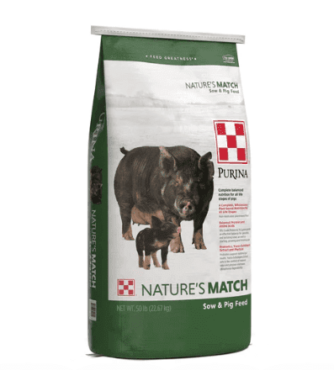
Nutrena Products
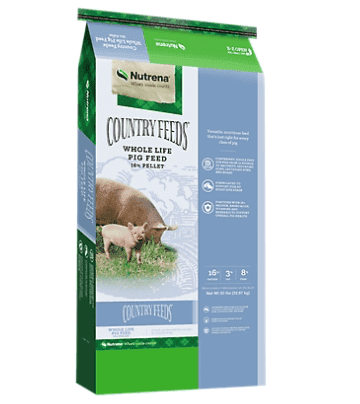
I always liked Blue Seal products and was able to get them from a feed and seed store near me. After a few years of being quite happy with this product, they decided
to change the formula. I decided to try something new. Along with me some folks I mentored changed as well and encountered the same issue.
After much research, I decided to try something new, Nutrena brands. Reading the analysis and ingredients, I believed this to be a great feed for our herd. Well after using it for four-six months, I was not happy with the way my pigs were turning out, and even worse, no one got pregnant the entire time I was using it, which was for about 4-6 months. Not sure what was missing in their feed but, it was enough that my KuneKunes did not feel they could sustain a pregnancy on it and just did not get pregnant.
Blue Seal/Home Fresh
As a result of this huge issue, I encountered the Nutrina brand, it sent me right back to my proven brand. Blue Seal. Now remember, they changed the formula and therefore, the name. Home Fresh is the new name. After just a few weeks of being back on blue seal products, low and behold we started to see breeding and later again pregnancies. So, KuneKunes need to have the proper nutrition for them to get pregnant.
Blue Seal makes a sow performance that is 17% protein that does extremely well for KuneKunes. While it is said you should feed a diet that is 16% and under, this feed just helps the pigs thrive. Blue Seal products would be purchased from a feed and seed store that carries Blue Seal products. I mentored breeders like Red Roof KuneKunes, and they followed me and decided to use this product as well. It is my understanding that they still do.
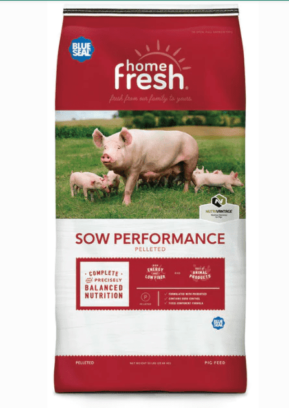
Provide a Balanced Diet of Grazing, Vegetables, and Fruits.
You can also supplement their diet with fruits and vegetables, but make sure to avoid feeding them anything that is toxic to pigs, such as avocado or chocolate. Vegetables such as carrots, broccoli, and kale can be given in moderation as a source of vitamins and minerals. Fruits like apples and bananas can also be given in moderation as a treat. It's important to avoid feeding your pig foods that are high in fat or sugar, as this can lead to health problems.
Surplus fruits and veggies
If you garden, your KuneKune will enjoy the surplus from your garden. Some of the things you do not want to feed your KuneKune are a lot of citruses, meaning limit oranges and tomatoes. Celery is said to bind their intestines if fed whole due to the strings of celery. Potatoes are not good for them due to the skin on the potatoes. Avocados are said not to be good for them either. I was the type of breeder that if I heard of anyone having issues with anything, I would avoid it. It is also said that corn on the cobs is also not good for them as the cobs can cause blockages.
If you don’t have a garden or have surplus fruits and veggies, then you can check with the farmer’s markets and connect with farmers that will consider giving you, their surplus. Some smaller grocery stores that are not chains will also sometimes give you surplus things that they can no longer sell. It is important to note they anything that has mold is not fed to your KuneKunes or anything spoiled.
Halloween time can be an excellent time to get pumpkins. They love pumpkins and it is good for them. Maybe contact a pumpkin patch to determine what they do with their pumpkins after the season is over. Check with friends and family to see if they will give you their left over pumpkins as well.
Avoid Feeding Your Pig Processed Foods and Sugary Treats.
When it comes to feeding your KuneKune pig, it's important to avoid processed foods and sugary treats. These types of foods can lead to health problems such as obesity, diabetes, and dental issues. Instead, focus on providing your pig with a balanced diet that includes grazing, hay, vegetables, and fruits. If you want to give your pig a treat, opt for a small piece of fruit or a vegetable like a carrot. Remember to always provide fresh, clean water for your pig to drink. By feeding your pig a healthy diet, you can help ensure they live a long and happy life.
It's common for farmers to use bread as a source of food for their KuneKunes, which is usually obtained from local bakeries. However, it's important to note that not all bread is created equal, and in many cases, feeding large quantities of bread to KuneKunes can do more harm than good.
In particular, outdated bread that is no longer fresh can be difficult for KuneKunes to digest, leading to potential health problems. While it's not necessarily bad to give the ends of a loaf occasionally, it's important to remember that bread serves no nutritional purpose for KuneKunes and should not be relied upon as a primary food source. Ultimately, it's important for farmers to carefully consider the nutritional needs of their KuneKunes and provide them with a balanced diet that includes a variety of foods, rather than relying solely on bread as a source of sustenance.
Grazing
Grazing should make up much of their diet, as it provides the necessary fiber for healthy digestion. It's also beneficial to provide your pigs with access to grazing areas, as they enjoy rooting around and foraging for food. This can also help supplement their diet with natural sources of nutrition. Make sure that your pastures do not contain toxic plants.
Contact other local farmers in your area to determine what grows best in your area. Another source of information for this is your local USDA office. Find out what would be best for you to plant and when to do your planting.
Provide Fresh Water and Mud Puddles
In addition to providing a balanced diet, it's important to ensure that your KuneKune pigs always have access to fresh water. Pigs can drink a lot of water, especially in hot weather, so make sure to check their water supply regularly and refill as needed. Having multiple water sources or dishes is particularly important as sometimes they will turn over their bowls. Keeping water fresh in the summer by changing it 1-2 times a day is the best practice.
To ensure that our KuneKunes never go without water we will also fill baby pools with water. This is surely a great tip. They cannot knock them over or spill them and you are assured they have a water source.
Well while mud puddles have nothing to do with feeding it is important that I mention, for their health and wellbeing they do need a mud puddle. We authored a great article about why mud puddles are so important for pigs.
Monitor Your Pigs' Weight and Adjust Feeding as Needed.
KuneKune means fat and round and balancing their weight between overfeeding and underfeeding is often difficult to figure out. It's important to monitor your KuneKune pigs' weight and adjust their feeding as needed to ensure they maintain a healthy weight.
The general rule of thumb to serve as a guide is 2 cups twice a day. It is important to note that a cup is an 8 oz measuring cup like you use for cooking. So, if you give your pig 2 cups twice a day per pig, that is the golden rule to go by. However, in the summer months depending on the quality of your pastures, it may be adjusted a small amount. Likewise, if you do not have grazing available in the winter months, adjustments may need to be made as well.
Important to note, that KuneKune females are like no other they are extremely intelligent and if you do not feed them enough, they will not get pregnant. Good quality grain and grazing can prevent this from happening.
Overfeeding
Overfeeding can lead to obesity and health problems, while underfeeding can result in malnutrition and stunted growth. You will particularly see this in the way that your piglets mature. Weigh your pigs regularly and adjust their feed, accordingly, considering their age, activity level, and overall health. Consult with an experienced pig farmer if you have any concerns about your pigs' diet or weight.
In Conclusion
So, as you can tell there is a balance from picking your grain to monitoring the health of your KuneKune. It is important to feed healthy grain and to provide not only grazing but also mud puddles and fresh water to ensure the health of your pigs. We hope that you have learned some important feeding information in this article. As we mentor all our members, please note that we are also available if you have any questions or concerns regarding your KuneKunes diet or weight. Don’t hesitate to reach out to us.
What do KuneKune pig eat?
KuneKune pigs will eat almost anything! That does not mean that is right for them. So, let us discuss what KuneKune pigs should eat.
KuneKune pigs are classified as true grazing animals, which means they prefer a diet consisting mainly of pasture or forage. Their natural feeding behavior includes grazing on grasses, herbs, plants, and roots. Therefore, providing ample grazing opportunities is crucial for KuneKune pigs, as it allows them to engage in their innate behaviors and promotes good digestion.
In addition to pasture, KuneKune pigs should also be offered a variety of high-quality supplementary feeds to ensure they receive a well-balanced diet. These supplementary feeds should consist of a mix of vegetables, fruits, and grains. Vegetables such as carrots, pumpkin, sweet potatoes, and leafy greens like spinach and kale are excellent choices due to their nutritional value and high fiber content.
Fruits like apples, pears, strawberries, and watermelon can also be included in their diet. However, it is important to note that fruits should be given in moderation due to their high sugar content. Feeding KuneKune pigs excessive amounts of sugary fruits can lead to weight gain and other health issues.
Grains, such as barley, and oats, can be provided as well. These grains should be offered in limited quantities and should never be the main component of their diet. Grains are high in carbohydrates and can contribute to weight gain and other health problems if overfed.
We are providing a link at the end that will go into depth about various food items that KuneKune can eat and what they will obtain nutritionally from adding these items to their diets.
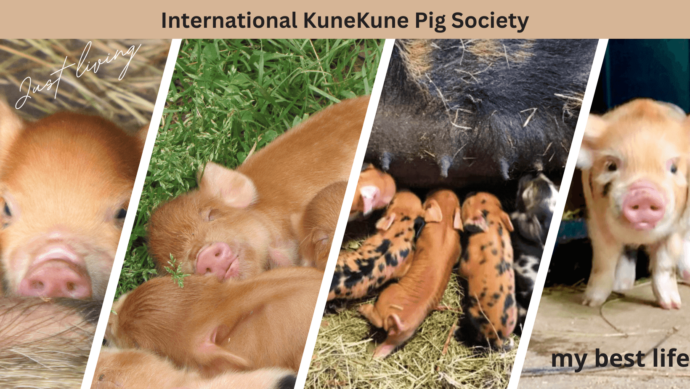
KuneKune Feeding Chart
This is a question we received numerous times a week. How much should I feed my "xx" month-old or "xx" year-old KuneKune pig? You asked so we will answer this.
The golden rule for feeding KuneKunes in general is 2 cups of grain twice a day per pig. Now that said, this does not mean any size cup. It means the kitchen measuring cup that has 8 ounces in it. A big gulp cup from 7-11 is going to be much bigger than a measuring cup. You would not believe the folks that did not understand that when I was mentoring them so I wanted to mention it here.
The exception to this rule is in the summer months when you have rich pastures they are grazing on. You can modify the 2 cups rule during these times. However, it is not advisable to do so on pigs that are still growing such as piglets under 1 year of age or even 18 months of age since KuneKunes mature slower than other breeds of swine. Remember as we stated above, if KuneKune pigs do not have what they need nutritionally it will directly reflect how they turn out as adults.
Another exception is in breeding females. As a breeder for 10 years, I found as well as other breeders have found, that not giving a sow or gilt that you are trying to get pregnant enough nutrition that she will not get pregnant. So for your breeding animals, particularly females, please make sure that you balance the amount you are giving her without a big reduction in her 2 cups twice a day.
Piglets under 12 months to 18 months
2 cups of grain twice a day per pig.
Meat Animals
Feeding the minimum amount to maintain a leaner pig is advisable. Especially since KuneKune pigs are a lard breed. Minimizing will help with excess fat in your meat products at butchering time.
Breeding Females
It is important to note that if KuneKune pigs do not feel there is enough food to sustain a litter, they may not get pregnant. Giving 2 cups twice a day should avoid this issue. Be careful not to feed more as it could cause issues to develop during delivery if they are overfed.
Sows that have farrowed
As a sow is feeding her piglets, it is vital to the growth of the piglets to feed properly. It is also important on how you feed the sow so that her milk is rich. Not feeding properly to the sow will make your piglets not develop and mature properly. Not everyone will agree with this schedule but, it worked for me for 10 years. My mentor asked me once how my piglets looked better than his when I was breeding his pigs..well, this may be one of the reasons.
Day of Delivery: feed double - 4 cups twice a day
When piglets are 2-3 weeks (increase in the amount the piglets are nursing from mom) 5-6 cups twice a day. Larger litters getting the high end. (6 or more)
When piglets are 5 weeks old (again an increase in the amount they are pulling from their mom and they are starting to each mom's food) - increase by 2 more cups twice a day.
When piglets are eating well with mom - increase by giving mom a large portion and spreading around her the feed for the piglet. Increase 1 cup per piglet to mom's feed.
Piglets that are weaning - 2 cups of grain twice a day per piglet.
Mom who has been removed from her piglets: go back to the 2 cups twice a day or you can start at 4 cups twice a day and wean down to the 2 cups twice a day over 3-5 days.
I promise you if you take great care of your sow she will take great care of the piglets!
What Can KuneKune Pigs Not Eat?
Below you have the answer to that question! We have broken it into three parts. First, we will discuss overweight and their inability to digest certain foods. Next, we will dig into more about human foods. Finally, we will discuss plants that KuneKune pigs can not eat. So, let's get started on these two important topics.
Introduction
KuneKune pigs, known for their docile nature and charming appearance, are a small and friendly breed that originates from New Zealand. They have gained popularity as pets and show animals. Despite their adorable appearance, KuneKune pigs require specific dietary considerations to ensure their health and well-being. While they can eat a wide variety of foods, there are certain items that should not be included in their diet.
Over Conditioning or Overweight KuneKunes
One crucial aspect to consider when feeding KuneKune pigs is their susceptibility to obesity. These pigs possess a slower metabolism compared to other breeds, which means they are more prone to weight gain. Consequently, it is essential to avoid feeding them high-energy or fatty foods. This includes limiting their consumption of foods rich in carbohydrates, such as grains or sugary treats. Overfeeding KuneKune pigs with such foods may lead to serious health issues, such as heart disease, joint problems, or even death.
Inability to Digest
Another critical consideration is the pig's inability to digest certain substances. KuneKune pigs should not be fed any toxic plants (more on this topic below), including certain garden flowers like daffodils, lilies, or tulips, as they can cause significant harm or even be fatal. It is important to educate oneself on the potential toxicity of various plants and ensure they are kept out of the pig's reach
Additionally, KuneKune pigs should avoid foods that are known to be harmful to most animals. For example, chocolate is known to contain theobromine, a substance that is highly toxic to pigs and can cause severe reactions, including vomiting, diarrhea, or even seizures. Similarly, avocado should be avoided as it contains a toxic compound called persin, which can cause digestive problems and cardiovascular issues for KuneKune pigs.
Although KuneKune pigs are omnivorous and enjoy a balanced diet that consists of both plant and animal-based foods, certain foods can create health complications for them. Meat products are not recommended for KuneKune pigs. It is advisable to avoid feeding them enormous quantities of onions and garlic, as both contain compounds that can harm pigs' red blood cells and lead to anemia. Additionally, any spoiled or moldy foods should be avoided, as they can harbor dangerous bacteria or fungi that may cause severe digestive problems in KuneKune pigs.
Summary
while KuneKune pigs are easy-going and adaptable, their dietary requirements must be carefully considered to ensure their well-being. Understanding what they should not eat is crucial to preventing potential health issues. These lovable creatures should be protected from consuming high-energy or fatty foods, as well as toxic plants, chocolate, avocado, onions, garlic, and spoiled foods. Providing a balanced diet with their specialized nutritional requirements will contribute to a long and healthy life for KuneKune pigs.
Poisonous Food for Pigs: Knowing What Not to Feed
Introduction
When it comes to rearing pigs, providing the appropriate diet is crucial for their proper growth, development, and overall health. Pigs are known for their voracious appetites, devouring an extensive range of foods. However, it is essential for pig farmers, pet pig owners, and individuals in rural areas to be aware of certain foods that are toxic for pigs. We will highlight some of the common foods that are poisonous to pigs and emphasize the importance of responsible feeding practices.
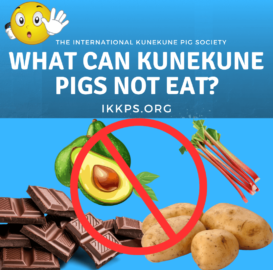
Chocolate
Chocolate: Delightful to human taste buds, chocolate contains theobromine, which is highly toxic to pigs. Consumption of chocolate by pigs can lead to severe symptoms such as vomiting, tremors, increased heart rate, seizures, and, in extreme cases, even death.
Onions and Garlic
These commonly used culinary ingredients contain compounds that can cause oxidative damage in pig red blood cells, leading to anemia. Feeding pigs with onions or garlic can result in weakness, pale mucous membranes, reduced appetite, and lethargy.
Avocado
While avocados are widely recognized for being rich in healthy monounsaturated fats, they are harmful to pigs due to the presence of a toxin called persin. Ingestion of avocados by pigs can lead to respiratory distress, fluid accumulation around the heart, and even death.
Raw Potatoes
Raw potatoes contain solanine and chaconine, toxic substances that can cause damage to the pig's digestive system and, in severe cases, result in death. Additionally, green, and sprouted potatoes have higher levels of these toxins and should be strictly avoided.
Rhubarb Leaves
While the stalks of rhubarb plants are safe to consume, the leaves are toxic to many animals, including pigs. The leaves contain elevated levels of oxalic acid, which can cause kidney damage, drooling, weakness, tremors, and, in some cases, death.
Moldy or Rotten Foods
Pigs have a keen sense of smell and can detect spoiled food. Consumption of moldy or rotten foods can lead to digestive issues, diarrhea, and other gastrointestinal problems. It is crucial to regularly assess the quality of the food provided to pigs, ensuring that it is fresh and free from contamination.
Importance of Responsible Feeding
Feeding pigs, a balanced diet that meets their nutritional requirements is crucial for their wellbeing. Farmers and pig owners should prioritize providing a healthy mix of grains, fruits, vegetables, and high-quality commercial feeds specially formulated for pigs. Alongside this, having access to clean, fresh water is vital in maintaining proper hydration and digestion.
Summary
While pigs may be opportunistic eaters, it is essential to avoid feeding them toxic or harmful substances. Foods like chocolate, onions, garlic, avocados, raw potatoes, rhubarb leaves, and moldy or rotten foods can have detrimental effects on a pig's health, ranging from gastrointestinal issues to severe toxicity. Educating pig farmers, pet pig owners, and individuals about the dangers of these foods plays a vital role in ensuring the well-being and longevity of these intelligent animals. Therefore, responsible feeding practices, a well-balanced diet, and regular monitoring of their nutritional intake are essential to keep pigs healthy and happy.
Plants that are poisonous
Introduction
Pigs are omnivorous animals that have a diverse diet. However, it is essential to be aware that certain plants can be extremely harmful or even deadly to pigs if ingested. Understanding which plants are poisonous to pigs is crucial for farmers or pig owners to ensure the health and well-being of these animals.
Castor Bean Plant
One of the most notorious plants that are toxic to pigs is the castor bean plant (Ricinus communis). All parts of this plant contain a potent toxin known as ricin, which can cause severe damage to the digestive system, liver, and kidneys. After ingestion, the pig may experience symptoms such as diarrhea, abdominal pain, excessive thirst, and rapid breathing. If left untreated, ricin poisoning can lead to organ failure and, in severe cases, death.
Hemock Plants
Another plant that is toxic to pigs is the hemlock plant (Conium maculatum). Hemlock plants contain several poisonous chemicals, including a highly toxic alkaloid called coniine. Pigs that consume hemlock may suffer from neurological symptoms such as muscle tremors, lack of coordination, convulsions, and respiratory distress. Ingesting substantial amounts of hemlock can be fatal to pigs, making it vital to eliminate this plant from their environment.
Nightshade
Although it may come as a surprise, many plants from the nightshade family (Solanaceae) are also harmful to pigs. Plants such as tomatoes (Solanum lycopersicum), potatoes (Solanum tuberosum), and various species of bell peppers (Capsicum annuum) contain a toxin called solanine. Ingestion of solanine can lead to symptoms like abdominal pain, vomiting, diarrhea, tremors, and even paralysis in severe cases. Farmers and pig owners should exercise caution and prevent access to nightshade plants to prevent these potential health risks.
Yew Tree
The yew tree (Taxus spp.) is another plant toxic to pigs. All parts of this tree, including the leaves, bark, and seeds, contain toxic alkaloids called taxines. Pigs that consume yew may exhibit symptoms like drooling, abdominal pain, difficulty breathing, trembling, and even sudden death. Due to the severity of yew poisoning, it is crucial to keep pigs away from areas where these trees are present.
Household Plants
Additionally, certain common household plants can be poisonous to pigs. These include lilies (Lilium spp.), azaleas (Rhododendron spp.), oleander (Nerium oleander), and rhubarb leaves (Rheum spp.). Ingesting these plants can cause symptoms such as gastrointestinal upset, cardiovascular issues, kidney damage, and in severe cases, death.
Pig owners and farmers need to be knowledgeable about the plants present in their surroundings and be able to identify these toxic species. Consulting with veterinarians or agricultural extension services can provide valuable information and guidance in creating a safe environment for pigs. Implementing appropriate fencing and regularly inspecting pastures can help minimize the risk of pigs accessing these poisonous plants.
Summary
While pigs have a diverse diet, it is essential to be aware of the plants that can be poisonous to them. The castor bean plant, hemlock, nightshade plants, yew trees, and various other plants pose serious health risks to pigs if ingested. Proper identification, removal, and prevention measures should be taken to ensure the safety and well-being of these animals.
Additional Articles
Registry Office
17500 Hamilton Arms Court Dewitt, VA 23840
